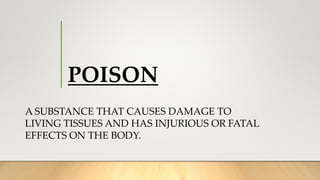Poison and falls.pptx
•Download as PPTX, PDF•
0 likes•35 views
poison
Report
Share
Report
Share

More Related Content
Similar to Poison and falls.pptx
Similar to Poison and falls.pptx (20)
administration of drugss.pptx regarding DRUG administration

administration of drugss.pptx regarding DRUG administration
More from TselisoTutuoane
More from TselisoTutuoane (20)
Recently uploaded
TỔNG ÔN TẬP THI VÀO LỚP 10 MÔN TIẾNG ANH NĂM HỌC 2023 - 2024 CÓ ĐÁP ÁN (NGỮ Â...

TỔNG ÔN TẬP THI VÀO LỚP 10 MÔN TIẾNG ANH NĂM HỌC 2023 - 2024 CÓ ĐÁP ÁN (NGỮ Â...Nguyen Thanh Tu Collection
Recently uploaded (20)
Measures of Central Tendency: Mean, Median and Mode

Measures of Central Tendency: Mean, Median and Mode
Asian American Pacific Islander Month DDSD 2024.pptx

Asian American Pacific Islander Month DDSD 2024.pptx
Energy Resources. ( B. Pharmacy, 1st Year, Sem-II) Natural Resources

Energy Resources. ( B. Pharmacy, 1st Year, Sem-II) Natural Resources
Russian Escort Service in Delhi 11k Hotel Foreigner Russian Call Girls in Delhi

Russian Escort Service in Delhi 11k Hotel Foreigner Russian Call Girls in Delhi
Z Score,T Score, Percential Rank and Box Plot Graph

Z Score,T Score, Percential Rank and Box Plot Graph
ICT Role in 21st Century Education & its Challenges.pptx

ICT Role in 21st Century Education & its Challenges.pptx
Beyond the EU: DORA and NIS 2 Directive's Global Impact

Beyond the EU: DORA and NIS 2 Directive's Global Impact
Presentation by Andreas Schleicher Tackling the School Absenteeism Crisis 30 ...

Presentation by Andreas Schleicher Tackling the School Absenteeism Crisis 30 ...
TỔNG ÔN TẬP THI VÀO LỚP 10 MÔN TIẾNG ANH NĂM HỌC 2023 - 2024 CÓ ĐÁP ÁN (NGỮ Â...

TỔNG ÔN TẬP THI VÀO LỚP 10 MÔN TIẾNG ANH NĂM HỌC 2023 - 2024 CÓ ĐÁP ÁN (NGỮ Â...
Poison and falls.pptx
- 1. POISON A SUBSTANCE THAT CAUSES DAMAGE TO LIVING TISSUES AND HAS INJURIOUS OR FATAL EFFECTS ON THE BODY.
- 2. HOW IT OCCURS IN THE HOSPITAL SETTING Prolonged use of some medications. Overdose of drugs and medications. Inhalation of detergents used in a hospital. Ingestion of contaminated food by patients causes botulism. Prescription of allergic medication to patients
- 3. DANGERS OF POISON TO PATIENTS, VISITORS & WORKING PERSONEEL • Fits • Gastroenteritis • Difficulty in breathing • Some patients coma death may result • Internal organ damage; brain damage • Skin rash
- 4. PREVENTIONS OF POISONING Keep all poisonous substances in a lockable cupboard, out of reach of all patients especially children All chemicals must be stored in bottles that a clearly labelled with the name of the chemical and strength of solution. The bottles should be clearly marked poison, with a lid that is tightly closed when not used Poisons must not decantated into other bottles Keep cleaning products in their original containers. Throw away old medicines or other potential poisons
- 5. FALLS Losing one’s balance and collapse OR Moving from a higher to a lower level typically rapidly and without control.
- 6. HOW FALLS OCCUR IN HOSPITAL SETTING • Slippery floors • Lack of energy • Impaired awareness • Patients on high risk medication(sedatives and antidepressants) • Impaired vision • Improper waste disposal( banana peels)
- 7. DANGERS OF FALLS TO PATIENTS, VISITOR AND WORKING PERSONNEL • Injuries • Disability • Fractures • Bruising • Bleeding • Osteoporosis( holes in bones) • Wounds
- 8. PREVENTIVE MEASURES TO FALLS • Put ‘slippery floor’ signs on wet floors • Have your eyes tested regularly • Use an assistive device if you need help feeling steady when you walk • Find out the effects of the medication you take • Wear properly fitting shoes and non slippery shoes • Light up the wards • Practice proper waste disposal